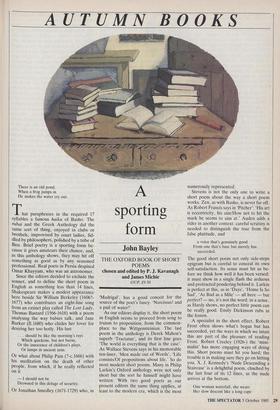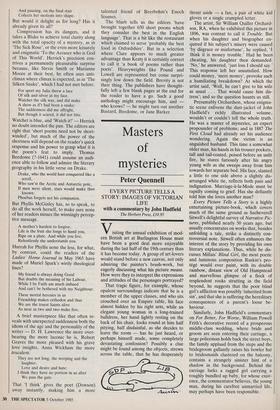AUTUMN BOOKS
There is an old pond. When a frog jumps in He makes the water cry out.
A sporting form
John Bayley
THE OXFORD BOOK OF SHORT POEMS chosen and edited by P. J• Kavanagh and James Michie That paraphrases in the required 17 syllables a famous haiku of Basho. The rubai and the Greek Anthology did the same sort of thing, enjoyed in clubs or brothels, improvised by court ladies, fid- dled by philosophers, polished by a tribe of Ben. Brief poetry is a sporting form be- cause it gives amateurs their chance, and, as this anthology shows, they may hit off something as good as by any seasoned professional. Real poets in Persia despised Omar Khayyam, who was an astronomer.
Since the editors decided to exclude the sonnet, and to define the short poem in English as something less than 14 lines, Shakespeare makes a modest appearance here beside Sir William Berkeley (1606?- 1677) who contributes an eight-line song from an extinct play called The Lost Lady, Thomas Bastard (1566-1618) with a poem analysing the way babies talk, and Jane Barker (fl.1680) who chides her lover for desiring her too hotly. His lust . . . should be like the morning's rays
Which quickens, but not burns, Or the innocence of children's plays, Or lamps in ancient urns.
Or what about Philip Pain (?-c.1666) with his meditation on the death of other people, from which, if he really reflected on it
— I should not be
Drowned in this deluge of security.
Or Jonathan Smedley (1671-1729) who, in OUP, £9.50 `Madrigal', has a good conceit for the source of the poet's fancy. 'Narcissus! and a pail of water!'
As our editors display it, the short poem in English seems to proceed from song to truism to proposition, from the common- place to the Wittgensteinian. The last poem in the anthology is Derek Mahon's superb `Tractatus', and its first line goes `The world is everything that is the case'. As Wallace Stevens says in his memorable ten-liner, 'Men made out of Words', 'Life consists/Of propositions about life.' So do most modern short poems. Many in Philip Larkin's Oxford anthology were not only short but the sort he himself might have written. With two good poets as our present editors the same thing applies, at least to the modern era, which is the most numerously represented.
Stevens is not the only one to write a short poem about the way a short poem works. Zen, as with Basho, is never far off. As Robert Francis says in 'Pitcher': 'His art is eccentricity, his aim/How not to hit the mark he seems to aim at.' Auden adds a rider in another context: careful scrutiny is needed to distinguish the true from the false platitude, and
a voice that's genuinely good From one that's base but merely has succeeded.
The good short poem not only side-steps epigram but is careful to conceal its own self-satisfaction. Its sense must hit us be- fore we think how well it has been versed: it must show in a single flash the arduous and protracted pondering behind it. Larkin is perfect at this, as in 'Days', 'Home Is So Sad', 'As Bad as a Mile' — all here — but perfect? — no, it's not the word: in a sense, as Hardy shows, no perfect little poem can be really good. Emily Dickinson rubs in the lesson.
A specialist in the short effect, Robert Frost often shows what's bogus but has succeeded, yet the ways in which we intuit this are part of the pleasure of reading Frost. Robert Creeley (1926-) the 'mini- malist' has more engaging ways of doing this. Short poems must hit you hard; the trouble is in making sure they go on hitting you. X. J. Kennedy's 'Nude Descending a Staircase' is a delightful poem, clinched by the last four of its 12 lines, as the nude arrives at the bottom.
One woman waterfall, she wears Her slow descent like a long cape And pausing, on the final stair Collects her motions into shape.
But would it delight us for long? Has it already given its all?
Compression has its dangers, and it takes a Blake to achieve total clarity along with the total opacity of a mystery, as in `The Sick Rose', or the even more leisurely and enigmatic 'To the Accuser who is God of This World'. Herrick's precision con- trives a permanently pleasurable surprise because, like Stevie Smith or Marianne Moore at their best, he often uses anti- climax where climax is expected, as in The Silken Snake', which I had not met before.
For sport my Julia threw a lace Of silk and silver at my face.
Watchet the silk was, and did make A show as if't had been a snake: The suddenness did me affright, But though it scared, it did not bite. Watchet is blue, and 'Watch it!' — Herrick no doubt intended the pun. The editors are right that 'short poems need not be short- winded', but much of the power of the shortness will depend on the reader's quick response and his power to grasp what it is the poem's feat to imply. Thomas Beedome (?-1641) could assume an audi- ence able to follow and admire the literary geography in his little verse on Drake.
Drake, who the world halt conquered like a
scroll, Who saw'st the Arctic and Antarctic pole, If men were silent, stars would make thee known: Phoebus forgets not his companion.
But Phyllis McGinley has, so to speak, to do all the work herself, to make sure none of her readers misses the winningly percep- tive message.
A mother's hardest to forgive. Life is the fruit she longs to hand you, Ripe on a plate. And while you live, Relentlessly she understands you.
Hurrah for Phyllis none the less, for what, by contrast, could the readers of the Ladies' Home Journal in May 1965 have made of Muriel Spark's wirily theological lines?
My friend is always doing Good But doubts the meaning of his Labour, While I by Faith am much imbued And can't be bothered with my Neighbour. These mortal heresies in us Friendship makes orthodox and thus We are the truest Saints alive As near as two and two make five.
A brief masterpiece like that often re- veals with unexpected suddenness both the idiom of the age and the personality of the writer — D. H. Lawrence the more over- bearing the more laconic he is, Robert Graves the more pleased with his grave love insights, Anna Wickham the more truculent.
They are not long, the weeping and the laughter, Love and desire and hate: I think they have no portion in us after We pass the gate.
That `I think' gives the poet (Dowson) away instantly, making him a more talented friend of Beerbohm's Enoch Soames.
The blurb tells us the editors 'have brought together 650 short poems which they consider the best in the English language'. That is a bit like the restaurant which claimed to serve 'probably the best food in Oxfordshire'. But in a selection where Clare appears to much greater advantage than Keats it is certainly correct to call it 'a book of poems rather than poets'. Heavyweights like Pound and Lowell are represented but come surpri- singly low down the field. Brevity is not their thing. The publishers have thought- fully left a few blank pages at the end for the reader to have a go. Such a good anthology might encourage him, and who knows? — he might turn out another Bastard, Beedome, or Jane Barker.



























































 Previous page
Previous page